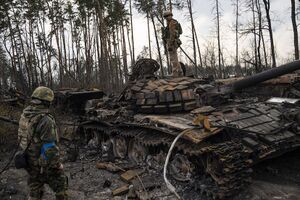Eulabian Civil War: Difference between revisions
mNo edit summary |
mNo edit summary |
||
| Line 9: | Line 9: | ||
| alt = | | alt = | ||
| caption = | | caption = | ||
| date = 14 August 2008 – 10 | | date = 14 August 2008 – 10 June 2010 ({{Age in years, months and days|14 August 2008|10 June 2010}}) | ||
| place = [[Eulabia]] | | place = [[Eulabia]] | ||
| coordinates = <!--Use the {{coord}} template --> | | coordinates = <!--Use the {{coord}} template --> | ||
| Line 48: | Line 48: | ||
The war saw the involvement of various regional forces, including those of Vitulia and Tauridia, which declared independence following the coup. The central Eulabian government struggled to maintain control, leading to widespread conflict primarily concentrated in these regions. Ostara, while initially reluctant to swear loyalty to Badoglio's regime, eventually conditionally supported the new government due to fears of Theedish expansion. | The war saw the involvement of various regional forces, including those of Vitulia and Tauridia, which declared independence following the coup. The central Eulabian government struggled to maintain control, leading to widespread conflict primarily concentrated in these regions. Ostara, while initially reluctant to swear loyalty to Badoglio's regime, eventually conditionally supported the new government due to fears of Theedish expansion. | ||
Despite initial setbacks, the loyalist forces, with leadership from the Triumvirate of Pablo Badoglio, Oswald Mosley, and corporate magnate Ulrich Karlsson, gradually consolidated power. The turning point of the war was the Siege of Syracuse in Vitulian island of Trinacria, the last major stronghold of the separatists, which capitulated in | Despite initial setbacks, the loyalist forces, with leadership from the Triumvirate of Pablo Badoglio, Oswald Mosley, and corporate magnate Ulrich Karlsson, gradually consolidated power. The turning point of the war was the Siege of Syracuse in Vitulian island of Trinacria, the last major stronghold of the separatists, which capitulated in June 2010. The successful end of the siege marked the conclusion of active hostilities and began the transition towards rebuilding the union. | ||
==Background== | ==Background== | ||
Revision as of 02:18, 9 August 2024
This article is incomplete because it is pending further input from participants, or it is a work-in-progress by one author. Please comment on this article's talk page to share your input, comments and questions. Note: To contribute to this article, you may need to seek help from the author(s) of this page. |
| Eulabian civil war | |||||||||
|---|---|---|---|---|---|---|---|---|---|
| Part of Council 13 - Leviathan conflict | |||||||||
 | |||||||||
| |||||||||
| Belligerents | |||||||||
| TMC Forces |
Separatists
| ||||||||
|
| |||||||||
| Commanders and leaders | |||||||||
| Strength | |||||||||
|
| |||||||||
| Casualties and losses | |||||||||
|
| |||||||||
| 30,000–50,000 civilians killed | |||||||||
The Eulabian Civil War was a multi-party armed conflict within the Eulabian Union that erupted following a military coup that ousted the pro-separatist federal government in August 2008. The conflict was primarily between forces loyal to the Transitional Military Council (TMC) led by General Pablo Badoglio and the coup's political figurehead, Oswald Mosley, and various separatist factions advocating for regional independence. The war resulted in the TMC forces victory in 2010 and later reformation of the Eulabian Union as the Commonwealth of Eulabia in 2012. It was the largest armed conflict in the Eulabian subregion since 1958[dubious ].
The Eulabian Union, established in 1958, experienced significant turmoil after the economic collapse triggered by the 1989 destruction of the Suez Canal. The ensuing economic crisis fuelled rising nationalism and separatism, leading to the so-called "Parade of Sovereignties" in 2007-2008, where member states declared precedence of local laws over Union laws, yet retained their nominal membership in the Union. This shift effectively reduced the federal union to a loose confederation, setting the stage for the civil war.
The Badoglio's coup was initiated on 14 August 2008, when Eulabian Armed Forces, led by Badoglio, seized control of key government institutions in response to a bloody crackdown on pro-Mosley demonstrators two days earlier by police loyal to the incumbent President of the Eulabian Executive Commission, Illse Beyen. This act escalated tensions across the union, with Lothringen declaring independence and subsequently being invaded by neighbouring Theedishland under the pretext of creating a buffer zone, citing security concerns and the protection of ethnic Theedish residents.
The war saw the involvement of various regional forces, including those of Vitulia and Tauridia, which declared independence following the coup. The central Eulabian government struggled to maintain control, leading to widespread conflict primarily concentrated in these regions. Ostara, while initially reluctant to swear loyalty to Badoglio's regime, eventually conditionally supported the new government due to fears of Theedish expansion.
Despite initial setbacks, the loyalist forces, with leadership from the Triumvirate of Pablo Badoglio, Oswald Mosley, and corporate magnate Ulrich Karlsson, gradually consolidated power. The turning point of the war was the Siege of Syracuse in Vitulian island of Trinacria, the last major stronghold of the separatists, which capitulated in June 2010. The successful end of the siege marked the conclusion of active hostilities and began the transition towards rebuilding the union.
Background
TBD
Timeline
TBD
Belligerents
TBD
